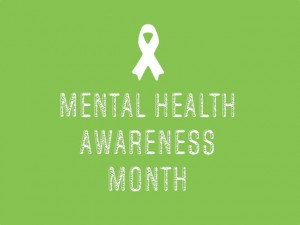 May is Mental Health Awareness Month. In last week’s post, we looked at different kinds of mental illnesses, the myths about these illnesses and some of the causes.
May is Mental Health Awareness Month. In last week’s post, we looked at different kinds of mental illnesses, the myths about these illnesses and some of the causes.
Today we will look at some lessons from the Old Testament prophet Elijah. It’s not what he has to say as much as what we can learn by observing his life.
Let’s start with a brief overview of I Kings 17-19. God works some miracles. No rain falls until Elijah says so. Ravens bring Elijah some food. Oil and flour multiply for a starving widow and her son. Later, Elijah raises the widow’s son from death.
Next, Elijah alone challenges 450 priests of Baal. He watches them prepare and offer their sacrifices to Baal, with no results. Then Elijah prepares and offers his sacrifice to God. He uses 12 stones, builds an altar, puts the wood on it, cuts up the bull and sacrifices it.
God accepts Elijah’s sacrifice, sends fire and consumes the altar. The people repent, capture the prophets of Baal, and Elijah kills all the evil prophets. The result is a big revival.
After all this occurs, Elijah tells King Ahab to hurry home and have a nice supper because it’s going to rain. But Elijah then runs ahead of Ahab 16 miles and arrives at Jezreel before the king and his chariot.
Ahab tells his wife, wicked Queen Jezebel, “Elijah has killed the priests of Baal.” Jezebel is so angry, she declares she’s going to kill Elijah. So he runs scared—in fact he runs 20 miles; then walks another 20 miles until he reaches the wilderness.
Then Elijah begs God to kill him. What’s with that? Is this man crazy? Suicidal? Depressed? Did he forget about the miracles God had just performed?
Elijah was a mighty man of God. Had he suddenly lost his faith?
No, he was not crazy and he had not lost his faith. He might have been depressed, certainly discouraged. Let’s look at what might be going on in his life and see if we can learn some tips about mental health.
First, Elijah is exhausted. Let’s look again at all the physical things he did. He completed a major building project by making the altar. Then he ran and walked several miles. He was tired, sleepy and hungry.
After Elijah asked God to kill him, he slept. Twice an angel woke him up and gave him food to eat. Then, after he was rested and full, he had the strength to go on.
Elijah simply needed to rest, sleep and eat good food. This was not a spiritual issue. It was physical.
In his Bible study, “To Walk and Not Grow Weary,” Fran Sciacca concurs, “Often what we consider a hopeless emotional or spiritual battle is actually due to our own neglect of basic physical needs, such as proper rest, food, and exercise.”
Lesson #1 – We need to take care of ourselves physically. When we are tired, we need to get enough rest and sleep. And we need to eat the right foods to give us energy.
Second, Elijah believed a lie. He said “I alone am left.” Yet the story mentions 100 other prophets and 7000 God-worshipers. Though Elijah was a man of God, he believed the lie that he was alone. He surely felt lonely and frightened to think he was the only God-follower in the entire nation.
Elijah needed to know and dwell on the truth.
Dr. Chris Thurman, in “The Lies We Tell Ourselves” states, “Most of our emotional struggles, relationship difficulties, and spiritual setbacks are caused by the lies we tell ourselves.”
Lesson #2 – We need to separate the truth from the lies and focus our thinking on truth.
Third, Elijah was isolated. Although other God-followers were in the story, for the most part, Elijah was isolated and so, he felt alone. Occasionally, his servant was with him, but he didn’t have fellowship with other God-followers. Though Elijah had experienced many victories, he was not only isolated, he was probably lonely.
Elijah needed companionship.
Larry Crab in “Connecting” expresses a similar belief, “The problem is disconnected souls. What we need is connection…community.”
Lesson #3 – We need to be around other people. We are not created to live in isolation.
From Elijah’s story, we can conclude that Elijah’s depression (his desire to die) was not primarily a spiritual issue. Rather, his physical exhaustion, his cognitive beliefs, and his social isolation influenced his emotions and his spirit. Because he was tired, misinformed and alone, he was mentally and spiritually unhealthy.
So what can we learn from Elijah about having good mental health?
The next time you’re feeling really stressed, anxious or discouraged, ask yourself if you’re exhausted, believing a lie, or isolated.
If so, find some extra time to rest, eat some healthy food, think about the truth, and connect with a friend. If those activities don’t help, then call your doctor, your pastor or a counselor.
And don’t forget GateWay of Hope is here to help. Call us at 913.393.GATE (4283).
©2016 Deborah Simon, Director of Counseling, GateWay of Hope
